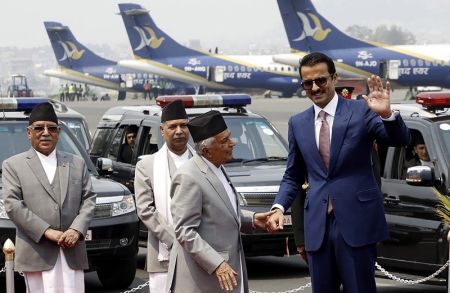.JPG)
--By Purna Man Shakya
Work force management is greatly influenced by the values owned by different generations. Generational values normally depend on the influence of the events and experiences people undergo during their lifetime and such values ultimately affect what they expect from employer. Study of generational values enables HR professionals to find right reasons for the workplace differences among different generations. The study gives insight into the mind sets of different generations and how each group sees the world and workplace. Generally, generational experiences surface in the workplace through differing values, expectations and work habits. Generations are normally categorized into four age groups in USA, despite substantial debate regarding the age boundaries.
a.Veterans/Traditionalists – Traditionalists are the War Babies who are now older than 60 years. They are born before 1947 and are parents of Baby Boomers.
b.Baby Boomers – Boomers are generally considered to be people born during 1947 – 1965.
c.Gen X –The Generation Xers are people born during 1966 – 1977.
d.Millenials – They are people born after 1978. They are the “cyber kids.” They grew up using the Internet. To them, high-speed access to information is something that has just always been there. They are called Y or nexters.
Research shows members of each generation have a tendency to exhibit similar characteristics. However, there are always exceptions and HR professionals and supervisors should be careful not to stereotype employees based on these tendencies. Let’s look at some basic workplace values of each generational group.
•Traditionalist: Traditionalists’ values are influenced by the experiences that often include the hardships of their parents and grandparents immigrating to a new country or location and making their way in a “new” land. The Traditionalist values are also impacted by experiences they had during the Great Depression and World War II, both of which shape how they view the world. Traditionalists’ rarely share inner thoughts and believe in formalities and hierarchical systems. They are hardworking, keep the word of mouth and have a mentality “you never know when you might need it”
•Baby Boomer: Baby Boomers represent the children of the World War II veterans. They had the good life and their parents, the Traditionalists, wanted them to have the best and as a result, the "Me" decade arrived. Their values were generally influenced by the movements such as civil rights, sexual revolution, Hippi culture, Cold war, Space travel etc. So, they did not go through the economic hard times as their parents did. In the workplace they wish to know why their work matters, how it fits into the big picture and what impacts it will have on them. They have relationship oriented attitude in the workplace. Boomers’ value peer competition, thrive on the constant change, value team work and generally do not prefer to be conformed to the rules. They are workaholic, career oriented, believe in inclusion by accepting people who perform as per standard and show readiness to fight for a cause.
•Generation Xer: Generation Xers are economically conservative. They remember double-digit inflation and the stress faced by their parents dealing with times on and off unemployment. As a result, they do not rely on institutions for their long-term security like their predecessors did. They are influenced by the events such as Fall of Berlin Wall, Women’s Liberation, energy crises, social diversities. They are techno literate, pragmatic, entrepreneurs taking work for fun, self- reliant, expect regular work feedback from the supervisors instead of intrusive supervision, love to play with information, work efficiently for availing enough personal time and prefer emails to long meetings and letters.
•Generation Y (often called Nexters): Generation Y represents people who grew up during the high-tech revolution. A world with high-tech video games, ATMs and high-speed access is what their generation is used to. Providing frequent and systematic feedback in real time (as it happens) is critical when working with members of this generation. They prefer autonomy, have optimistic outlook on life in general, accept more diversities, fond of making and spending money, technology is used for multi tasks, accept challenges, prefers to maintain work-life balance, prefer volunteerism, prefer to be identified by profession not by employing organization, believe in quality work rather than quantity work, prefer career flexibility, prefer continuous feedback from managers regarding performance, work comfortably in teams in order to accomplish independent tasks and are more individualistic than their predecessors.
Strategies for Leading the Generations
Basically coaching relationship, mentoring and inter-generational trainings are three strategies supervisors can use to build relationship among generations in the workplace.
•Coaching relationship: The most influential relationship in the workplace is between a supervisor and his/her direct report. The relationship can further be strengthened with the coaching relationship tool established one-on-one basis and in accordance with each employee’s preferred learning style. Coaching relationship tool facilitates open communication between supervisor and direct reports. The relationship tool allows supervisors gain important insight to how their direct reports prefer to be managed on one hand, and on the other, encourages adapting work styles to generational preferences.
•Mentoring: Mentoring is another effective tool and can fulfil different needs for each generation. A traditionalist feels that his knowledge has been valued if he is allowed to mentor X and Y generation employees. The mentoring also gives a feeling of proper guidance to generation X and Y employees. Further, the mentoring relationship can be used as a tool for passing along the experienced worker’s valuable job-knowledge that may not be captured by a desk manual.
•Inter-generational training: Inter-generational training is another key tool for making different generation employees accept each other’s values. In these training sessions participants experience how different generations react and interact with each other.
In conclusion, HR professionals and supervisors must learn to identify strengths and limitations of different generations in order to implement strategies to capitalize on each employee’s respective strengths. Understanding the needs of different generations allows teams to work effectively while satisfying their individual needs. When combining several generations, the success of an effective team is fostered by each member demonstrating respect, honesty, and flexibility in their interactions with team members. Individual supervisors can address the needs of their direct reports by building skilful interpersonal relationships, coaching, mentoring and generational trainings. Organizations that embrace change and employees’ diversity will improve retention while remaining competitive in today’s job market as change is only the constant factor in today’s workforce management.
Shakya is a Lecturer at Grammar Public College, a Management Consultant with BS Nepal and Chairman of Sarathi Nepal, Lalitpur. The article is based on a discussion organised by Real Solutions recently.





















